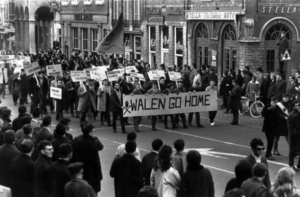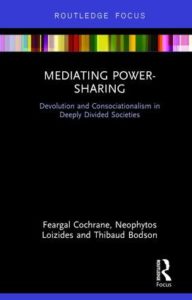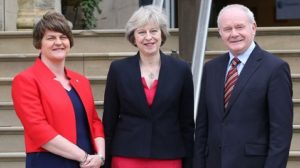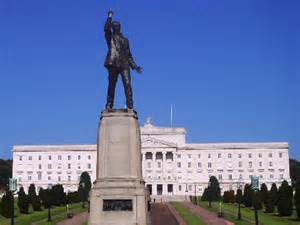Following the recent collapse of talks between the DUP and Sinn Féin over restoring devolved government, has the power-sharing set-up we’ve experienced so far helped or hindered efforts to ‘normalise’ politics in Northern Ireland? If an agreement is eventually reached, what could the Assembly do or change to make it work next time around? Should there be an official opposition to the ‘big two’, what lessons can be learned from the first and last SDLP-UUP experiment in 2016-2017? Northern Slant Editor, Connor Daly spoke to Professor Feargal Cochrane, University of Kent colleague Professor Neophytos Loizides, and Thibaud Bodson, who have just published a new book on power-sharing. Mediating Power-Sharing: Devolution and Consociationalism in Deeply Divided Societies examines the different ways in which consociational institutions emerge from negotiations and peace settlements across three cases – Northern Ireland, the Brussels Capital Region and Cyprus. You can find out more about the book here.
Does Northern Ireland compare favourably or unfavourably with the other examples you cite in your book?
Given the recent very public crash-landing of talks to restore devolved government, we would be pessimistic about the prospects for power-sharing in Northern Ireland being revived in the short term. But once the mutual recrimination has subsided, we believe that there are grounds for greater optimism about the future of devolved government in Northern Ireland.
Overall, and despite the current dysfunctionality that we examine within Northern Ireland’s devolved institutions, it actually compares relatively well with places such as Cyprus and the Brussels Capital Region. It needs to be remembered where Northern Ireland has come from in any assessment of its current problems, and we are still talking about a society with endemic structural divisions, coming to terms with a generation of ethnonational political violence. This was in turn based on several generations of political malaise, apathy and grievance, within a one-party rule system of unionist dominance, governed through emergency law, from 1922-1972.
As we demonstrate in the book, the concept of power-sharing, that today sits at the heart of political debate in Northern Ireland, did not always have cross community support in principle –if not currently in practice. During the 1970s for instance, power-sharing was publicly shunned by mainstream unionist politicians such as Enoch Powell of the UUP, who, in a House of Commons debate in 1978, referred to- ‘that abominable absurdity of power-sharing, intolerable to any good democrat’.
Today of course, it is accepted (at least in theory) by the vast majority of unionist politicians and their voters. Mainstream Irish republicans, for their part, (and they are mainstream these days,) now accept the legitimacy of the political institutions in Northern Ireland as well as the police service and criminal justice system. (Sinn Féin MLA) Gerry Kelly demonstrated this very recently when he reportedly apologised for apparently being caught cutting off a wheel clamp on his car with bolt cutters following a visit to the gym. ‘No one can be above the law’ was his contrite response, after being interviewed by the police about the incident – not a phrase that would have been in common usage by republicans in the 1970s and 1980s. Republicans now largely shun the notion of ‘armed struggle’, while Sinn Féin – having once defended it, now unreservedly condemns anyone who engages in politically-motivated violence.
Unlike either Cyprus or the Brussels Capital Region, Northern Ireland has had to overcome a generation of visceral violence and reconfigure conflict relationships relatively quickly, across the main political parties and within the electorate. Unlike Cyprus, Northern Ireland succeeded in negotiating a comprehensive political settlement in 1998. The Good Friday Agreement (GFA) was far from perfect and key issues were left out of it – but eventually both policing reform and illegal weapons decommissioning were satisfactorily resolved.

Unlike in Cyprus, not only did the main political elites reach a political accommodation (one that the DUP also eventually made peace with) but the wider electorate also supported it in a referendum that delivered a 71% mandate for the agreement. As we suggest in the book, the Brussels Capital Region has arguably been more adept at building what we refer to as a ‘living consociationalism’ – i.e. the capacity to adapt its institutions in order to address major political concerns raised by the different community groups. However, the Brussels’ model has not faced the significant challenges experienced by Northern Ireland over the last 20 years, so arguably there was greater political space for this to take place.
In the case of Brussels, we identify a two-tier power-sharing system, where an effort is made to integrate alternative interests through a coalition of moderates who have reached a programmatic agreement on governance. If the integration of alternative inter-ethnic interests fails, however, the Brussels structure has a default solution, where majorities in each group allow for the appointment of cabinet ministers independently (a modified version of the NI system). Each of our cases shows different adaptations to the practice of power-sharing.
It’s important to note, that hardly anyone in Northern Ireland today is arguing with the concept of power-sharing or co-operation with the Irish Republic on the basis of mutual consent. We are just arguing (a lot) about the past, about ‘parity of esteem’ over British and Irish cultural expression and about the integrity of those elected to operate the devolved political institutions.
After a mechanism allowed for a formal opposition at Stormont, we saw the UUP and SDLP come together in the 2016-2017 Assembly term, but when it came to a snap election it didn’t work. Can we have any hope for normalised politics here?
The emergence of an embryonic opposition within the Northern Ireland Assembly has been one of the most intriguing political developments since the devolved institutions were established in 1999. The fact that formal opposition emerged at all demonstrates that ‘normalised politics’ can and has been built in Northern Ireland. Not clearly to its full extent, or to the level of post-conflict, ethnically-blind functionality, that many people would desire –but as we demonstrate in the book, the political system has moved on significantly from its starting point following the GFA in 1998.
The political focus when the devolved institutions were in operation, was very much located in Belfast and political debate rotated around normal political issues relating to the spending of public money and governance across key areas of social and economic policy such as the health and education sectors, as well as the economy and employment. For better or worse, and especially during the period from 2007-2016 when the institutions operated with some level of continuity and without suspension, politics in Northern Ireland (and media coverage of it) was focused on what was going on in the Assembly and Executive and how this was affecting the lives of people who lived in Northern Ireland.
Former US Senator George Mitchell who played a key role as mediator and Chair of the Multi-Party Talks that resulted in the GFA in 1998, commented afterwards that he dreamed of returning one day with his young son Andrew, who was born during the negotiations, and that one rainy afternoon they would sit together in the visitor’s gallery of the Assembly, listening to debates around normal political issues concerning education, health care and agriculture policy. There would be no discussion of war –because the war would have long been over and no talk of peace because it would have been long established.

The Senator and his son eventually made this journey in 2012 and sat in the gallery listening to such debates. There have been many rainy afternoons since, and many discussions in the Assembly over such ‘normal’ political issues. None of this disguises the fact that the institutions have so far proved unstable, dysfunctional and relatively poor at addressing key issues that remain unresolved, notably so-called ‘legacy issues’ relating to the conflict, as well as matters concerning rival claims over cultural identity between unionist and nationalist communities.
While an Irish Language Act has been the latest sticking point preventing a return of devolved government, this is a symptom of a deeper malaise between the main parties and their supporters. Essentially it boils down to the fact that nationalists do not feel that unionists (and the DUP in particular) respect their right to be Irish or adhere to the principle of ‘parity of esteem’ with the unionist desire to be British –so they need to legislate for it. For their part, unionists feel that nationalists do not respect their right to be British and are engaged in efforts to culturally ‘greenwash’ Northern Ireland, to the point where it becomes indistinguishable from the rest of the island. This fundamental lack of trust lies behind the red lines that are being drawn by the political parties over language rights.
That being said, it seems that an ‘accommodation’ had been reached between Sinn Féin and the DUP on these issues with some deft drafting over the choreography of legislating semi-separately, to give status to the Irish language as part of a wider agreement over cultural identity. The DUP appears to have walked away from this at the 11th hour, not on principle, but because it felt it could not deliver the wider party and electorate for the deal. That is a different and more positive scenario, than an ideological schism and one that in the end relates to timing and the creation of sufficient political space.
Getting to the specific language of the question however in relation to the experiment of having a formal opposition in the last incarnation of devolved government, there are two issues that need a little more clarification. The first, is that opposition was a plural not a singular phenomenon, in that the UUP and SDLP went into formal opposition separately rather than together –with two distinct voices rather than as one unified opposition group. They were joined by the Alliance Party and by a number of others as informal opposition voices with different policy agendas, such Jim Allister’s Traditional Unionist Voice (TUV) and also People Before Profit representatives, Gerry Carroll and Eamonn McCann. So, there were Oppositions –not an Opposition, and this is one of the reasons why they could not come together to present an alternative policy platform to voters in the March 2017 Assembly Election.

The second issue with respect to this was that the election came barely 8 months after the UUP and SDLP had taken the step to enter official opposition. This was unfortunate for both parties as they had very limited time to work through how they could unite over issues in opposition while retaining their distinct party identities. It wasn’t a merger; –ironically, it was an informal power-sharing arrangement of its own, where both parties acted as separate entities with their own policy platforms. They needed to manage this rather awkward non-official alliance, while at the same time make a mark on the public consciousness with a clear and coherent critique of the governing DUP-SF Executive. It never quite gelled. The limited period between the 2016 and the 2017 Assembly Elections made it very difficult for the SDLP and UUP to do this and of course we will never know if they could have done so had the 2016 mandate run its full term. If, as now seems likely, there will be an extended period of direct rule, it will be interesting to see if the UUP and SDLP join forces over their critique of DUP-Sinn Féin failure to reach agreement over restoring power-sharing.
In your book, you write that to be successful power-sharing has to adapt – or have the capacity to adapt – to changes in the political landscape. What chances have our politicians missed?
It’s easy to be wise in hindsight of course –and it is also easy to blame our politicians while we re-elect them on manifestos that tie them to existing positions and make it more difficult for them to move away from these towards compromise or progressive change. It is a sad reflection on the entire electorate in Northern Ireland, over several generations, that no mainstream leader of unionism or nationalism has lost their position because they were too extreme, or because they wrapped themselves up in what is popularly referred to as ‘tribal politics’. More have fallen because they were perceived to be too moderate –though unionism has the lion’s share of political fallers in this respect. DUP Leader Arlene Foster provided a textbook example when she walked away from the ‘accommodation’ with Sinn Féin on 14 February, as she made the calculation that it was safer, either for her personal career, or for the fortunes of her party, to fail rather than to succeed in reaching an agreement with Sinn Féin to restore the political institutions.

So, we need to take a long hard look in the mirror as a collective electorate, rather than just blaming the ‘folks on the hill’ for the missed opportunities that have come and gone.
Having got that caveat out of the way –there have been numerous points along the road since the GFA in 1998, where greater political leadership and long term strategic thinking would have been useful. The press conference on 10 April 1998 when the GFA was finally reached, is one such example. Aside from the UK and Irish Prime Ministers, few declared it as a historic compromise, or held the GFA up as a joint project between those from the unionist and nationalist sides who were signing up to it. Instead, it was spun as either a strengthening of the Union, or as a stepping stone to Irish reunification.
The subsequent referendum, though eventually endorsing the agreement with a healthy 71% majority –suffered from a lack of a joint campaign from the pro-Agreement parties and had to be held together by the independent Yes Campaign led by civil society voices. The debate over the decommissioning of illegal weapons, quickly became identified as a test of political virility between the UUP and Sinn Féin, rather than an operational challenge that had to be met from all groups with illegally held weapons. Arguably the UUP got itself into a twist by tying its own participation in the GFA’s institutions to the whims of the internal politics of the Provisional IRA over weapons decommissioning –not helped by elastic language within the GFA which Sinn Féin was a party to, but crucially the PIRA was not. Trimble’s leadership of the UUP withered on the vine in this stand-off, while unionist support for the GFA (which was fragile from the outset) was steadily undermined.
More recently, the event that precipitated the most recent collapse of the devolved institutions, the Renewable Heating Incentive (RHI) ‘Cash for Ash’ scandal, could have been handled better had relations between the DUP and SF not reached such a low ebb by the beginning of 2017. DUP leader Arlene Foster, potentially missed an opportunity to stand aside as First Minister for a limited period, as her predecessor Peter Robinson had done, before he was exonerated and resumed office again. Foster should have known this as she was the acting First Minister on that occasion and so presumably had a birds-eye view of how to operate in such delicate circumstances. Instead, the parties refused to budge, took up hardline positions with the plug finally pulled by the late deputy First Minister Martin McGuinness.
Another missed opportunity, as we detail in the book, was that the DUP and SF have had an opportunity in recent years, to take some of the negative voting behaviour out of the electoral system and promote the notion that some level of partnership existed within the Executive. The formal change of the Office of First Minister and deputy First Minister (OFMDFM) to the Executive Office was a start, but the continuance of the nomenclature of First Minister and deputy First Minister, maintains an unnecessary and unhelpful illusion. Namely that the First Minister is more important or has more seniority than the deputy First Minister. In reality this is a jointly held position and one is not subservient to the other. This was of course painfully exposed in January 2017 when deputy First Minister Martin McGuinness resigned, causing the First Minister to also have to step down. There have been opportunities to convert this into a Joint First Minister position but these have been spurned. We argue in our book that this is a relatively simple reform that would promote the symbolism of the political system being based on equality and partnership between the unionist and nationalist communities –but this is an opportunity that is yet to be grasped.
 Another missed opportunity, as we detail in the book, was that the DUP and SF have had an opportunity in recent years, to take some of the negative voting behaviour out of the electoral system and promote the notion that some level of partnership existed within the Executive. The formal change of the Office of First Minister and deputy First Minister (OFMDFM) to the Executive Office was a start, but the continuance of the nomenclature of First Minister and deputy First Minister, maintains an unnecessary and unhelpful illusion. Namely that the First Minister is more important or has more seniority than the deputy First Minister. In reality this is a jointly held position and one is not subservient to the other. This was of course painfully exposed in January 2017 when deputy First Minister Martin McGuinness resigned, causing the First Minister to also have to step down. There have been opportunities to convert this into a Joint First Minister position but these have been spurned. We argue in our book that this is a relatively simple reform that would promote the symbolism of the political system being based on equality and partnership between the unionist and nationalist communities –but this is an opportunity that is yet to be grasped.
Another missed opportunity, as we detail in the book, was that the DUP and SF have had an opportunity in recent years, to take some of the negative voting behaviour out of the electoral system and promote the notion that some level of partnership existed within the Executive. The formal change of the Office of First Minister and deputy First Minister (OFMDFM) to the Executive Office was a start, but the continuance of the nomenclature of First Minister and deputy First Minister, maintains an unnecessary and unhelpful illusion. Namely that the First Minister is more important or has more seniority than the deputy First Minister. In reality this is a jointly held position and one is not subservient to the other. This was of course painfully exposed in January 2017 when deputy First Minister Martin McGuinness resigned, causing the First Minister to also have to step down. There have been opportunities to convert this into a Joint First Minister position but these have been spurned. We argue in our book that this is a relatively simple reform that would promote the symbolism of the political system being based on equality and partnership between the unionist and nationalist communities –but this is an opportunity that is yet to be grasped.
One of the reasons for this –returning to a theme outlined earlier- is that negative voting suits the two main parties in terms of their own internal elections within their respective ethnonational sides. To paraphrase the logic: ‘The only way to stop Martin McGuinness getting the First Minister job –was to vote for Arlene’ or, ‘the only way to put some manners on the DUP, was to vote for SF as a counterweight to unionist arrogance’. This retreat to negative voting has been useful in terms of getting the vote out and maintaining the dominance of the DUP and SF within their respective ethnonational groups –but it is much less useful in developing coherent policy platforms to deal with the challenges that face Northern Ireland or manifestos with some level of common ground between the DUP and SF that would give them some coherence when they return to government.
In a recent interview we ran with Quintin Oliver, who ran the ‘YES’ campaign to the Good Friday Agreement, he said “the peace process has plateaued, not collapsed.” How would you describe the current state of the peace process? Has Brexit changed everything?
Despite the decision of the DUP to walk away from talks with Sinn Féin over restoring devolved government on 14 February, we would be in broad agreement with Quintin’s judgement for the reasons outlined above. The negatives are clear to see of course, sectarianism remains and structural division is still endemic within Northern Ireland society. Relations between the main political parties are currently at rock bottom and the electorate seem happy to reward Sinn Féin and the DUP for continuing on their current course rather than demanding that they change it.
That being said, both parties are acutely aware of the benefits of restoring the devolved institutions. It would allow both to demonstrate leadership and relevance to the electorate, not least as the Brexit negotiations move towards their conclusion. The DUP is instinctively a party of devolution and it knows that the arithmetical fluke that led to its ‘Confidence and Supply’ arrangement with the current government will only last for as long as the government does –and on current form that might be measured in months rather than years. A return to devolved government would also provide a welcome early win for Sinn Féin’s new President Mary Lou McDonald and position Sinn Féin very nicely for the next phase of its development in the Irish Republic.

Bestriding all of this of course is Brexit, which is the biggest long-term threat to the peace process. This is not just because the DUP and SF take opposing positions, (being Leave and Remain respectively), or that it is clear from survey data that the Leave/Remain cleavage overlaps almost exactly with the main ethnonational division, with nationalists being very pro remain and unionists being pro leave.
Perhaps more important than any of these factors, is that the Anglo-Irish relationship, that sat at the heart of the peace process, through the Anglo-Irish Agreement of 1985, the Downing Street Declaration of 1993, the Joint Frameworks Document in 1995, the Good Friday Agreement in 1998 and the St Andrews Agreement in 2006, is now beginning to lose its bi-partisan consensus. It is now no longer the case that on Northern Ireland affairs when either Dublin or London opens its diplomatic mouth, the same sound comes out. A partnership approach between London and Dublin was the foundation that the peace process was built upon (along with some solid underpinning from Washington). If this breaks down over Brexit then the peace process may stop plateauing and start slipping back down the slope.
So, in this respect –yes Brexit is a game-changer in terms of politics in Northern Ireland and the peace process more specifically. There are a number of reasons for this, aside from the evolving relationship between London and Dublin. Firstly, of course, the spectre of a border re-emerging in Ireland dominates public discourse on Brexit. While everyone declares their commitment to maintaining the Common Travel Area (CTA) in Ireland and have as frictionless a border as possible, no one can really guarantee this. Everything at the moment is based on what the UK, EU and Irish governments would like to see happen –but no one can guarantee the aspirations expressed.
Secondly, it is not just a matter of a physical border –this is an existential matter for many Irish nationalists and possibly some unionists as well –and that is not really fully understood in GB.

Also Brexit picks at the internal logic of the GFA and at the consent principle in particular –previously much valued by unionists but now cast asunder as they try to tie their futures on to Team GB. The consent principle is now much more important to SF, which is a little ironic, given that they spent most of their existence denying the legitimacy of the Northern Ireland ‘statelet’.
But despite all of this there are reasons for optimism too. In the greater scheme of things, the RHI Inquiry and the future of an Irish Language Act will not destroy the peace process or devolved government in Northern Ireland. Both the DUP and SF are ultimately pragmatic parties and will make intelligent and rational choices based on what is in their political interests. Making a success of the restoration of devolved government, with all the political capital that comes with that, is likely to be a priority for both parties –in the medium term if not immediately. Devolution is in the political DNA of the DUP and with Brexit on the horizon and difficult economic times ahead, the temperature of the electorate may change over the coming months.
We do seem set now for a prolonged period of direct rule and the DUP called for this to be restored when they walked out of the talks with Sinn Féin. However, this is unlikely to be like the sort of direct rule we have seen in the past. In fact, it is quite likely that the next phase of direct rule might have a distinctly green rinse through it, with a Secretary of State who stops off for tea in Dublin every week when they get on the helicopter in Belfast on their way back to London. Nothing formal of course –just informal, purely consultative, just to oils the wheels of the Brexit transition, from the one key EU State that the UK is likely to need for any negotiated deal it reaches with the EU.
So for unionists looking to direct rule as preferable to the deal they have just walked away from with Sinn Féin, our advice would be to be careful what you wish for. After all, the British government could bring in an Irish Language Act via direct rule if it wanted to, and a lot more besides –and who knows what price GB would be willing to pay for a Brexit deal endorsed in Dublin?
Also published on Medium.
